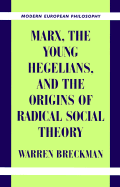Book contents
- Frontmatter
- Contents
- Acknowledgments
- Introduction
- 1 At the End of Idealism: From “Nihilism” to “Positive Philosophy”
- 2 The Transcendent Sovereign and the Political Theology of Restoration
- 3 Ludwig Feuerbach and Christian Civil Society
- 4 The Social and Political Discourse of Personality, 1835–1840
- 5 Pantheism, Social Question, and the Third Age
- 6 Arnold Ruge: Radical Democracy and the Politics of Personhood, 1838–1843
- 7 Karl Marx: From Social Republicanism to Communism
- Conclusion
- Bibliography
- Index
5 - Pantheism, Social Question, and the Third Age
Published online by Cambridge University Press: 11 January 2010
- Frontmatter
- Contents
- Acknowledgments
- Introduction
- 1 At the End of Idealism: From “Nihilism” to “Positive Philosophy”
- 2 The Transcendent Sovereign and the Political Theology of Restoration
- 3 Ludwig Feuerbach and Christian Civil Society
- 4 The Social and Political Discourse of Personality, 1835–1840
- 5 Pantheism, Social Question, and the Third Age
- 6 Arnold Ruge: Radical Democracy and the Politics of Personhood, 1838–1843
- 7 Karl Marx: From Social Republicanism to Communism
- Conclusion
- Bibliography
- Index
Summary
Eduard Gans rejected the Saint-Simonians' conversion of the science of society into a new social religion. In the 1830s, however, such reticence was unusual among those progressive Germans who felt themselves attracted to the teachings of the early French socialists. Indeed, for some of the most significant left-wing intellectuals of that decade, the convergence of German philosophy, the Saint-Simonian rehabilitation of matter, and the French tradition of revolutionary egalitarianism provoked a profound reassessment of their German philosophical inheritance. As we saw in the previous chapter, the combination of German metaphysics and French social thought helped to move the German debate about pantheism and personalism toward a new set of social concerns. Under the pressure of this ideological amalgam, the misgivings about the politico-social effects of Christian inwardness that we first found in Feuerbach's early works became sharpened into an explicit attack on Christian culture's egoism and its indifference to material need; moreover, under its sway, a number of radical German intellectuals were prompted to cast their thought in the form of social theology. In addition to giving these Germans a compelling prophecy of religious and social “conversion,” the New Christianity led them to search for an activist principle that would make philosophy a force of change in the world. In what follows, this overlapping of French and German themes will be pursued in the works of Heinrich Heine, Moses Hess, and August Cieszkowski. The chapter will end with a reconsideration of Feuerbach's seminal critique of theology and Idealism in the light of the social pantheism that is encountered in Heine, Hess, and Cieszkowski.
- Type
- Chapter
- Information
- Marx, the Young Hegelians, and the Origins of Radical Social TheoryDethroning the Self, pp. 177 - 220Publisher: Cambridge University PressPrint publication year: 1998

